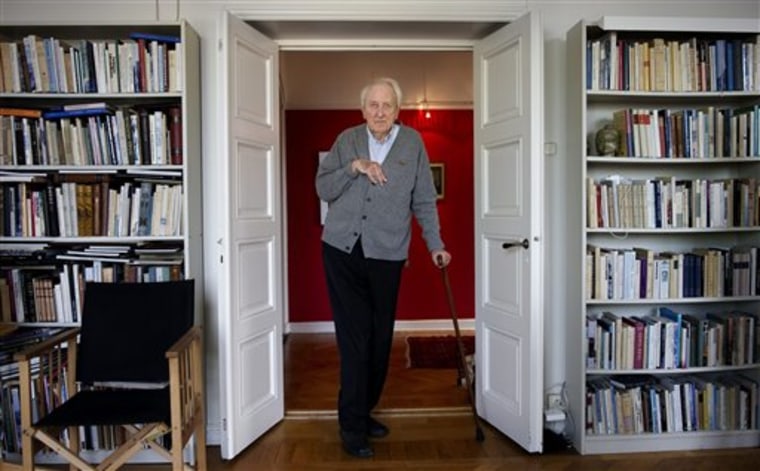The 2011 Nobel Prize in literature was awarded on Thursday to Tomas Transtromer of Sweden, whose surrealistic works about the mysteries of the human mind won him wide recognition as the most influential Scandinavian poet of recent decades.
Characterized by powerful imagery, Transtromer's poems are often built around his own experiences and infused with his love of music and nature. His later poems are darker, probing existential questions of life, death and disease.
"Waking up is a parachute jump from dreams. Free of the suffocating turbulence the traveler sinks toward the green zone of morning," the prelude reads. "Things flare up. From the viewpoint of the quivering lark he is aware of the huge root systems of the trees, their swaying underground lamps. But aboveground there's greenery — a tropical flood of it — with lifted arms, listening to the beat of an invisible pump."
A psychologist and avid amateur pianist, Transtromer (TRAWN-stroh-mur), 80, suffered a stroke in 1990 that left him half-paralyzed and unable to speak, but he continued to write and published a collection of poems — "The Great Enigma" — in 2004. He has since retired from writing.
Perennial favorite
Transtromer has been a perennial favorite for the Nobel and in recent years Swedish journalists have waited outside Transtromer's apartment in Stockholm on the day the 10 million kronor ($1.5 million) award is announced.
"He's writing about big questions. He's writing about death, he's writing about history and memory, and nature," said Peter Englund, permanent secretary of the Swedish Academy, which awards the prize.
Transtromer is the first Swede to receive the literature prize since Eyvind Johnson and Harry Martinson shared it in 1974. Englund has said that the academy is especially cautious about awarding Swedish writers out of fear of being seen as biased.

"I think we've been quite thoughtful and haven't been rash," Englund said after the award was announced.
Swedish Prime Minister Fredrik Reinfeldt said the award made him "happy and proud," and he hoped it would draw global attention to Swedish literature.
The Swedish Academy has also been criticized for being too Euro-centric, ignoring writers from other parts of the world. Seven of the last 10 winners have been Europeans.
Psychology and poetry
Born in Stockholm in 1931, Transtromer was raised by his mother, a teacher, after she divorced his father — a journalist. He started writing poetry while studying at the Sodra Latin school in Stockholm.
His work was published in several journals before he published his first book of poetry, "17 poems," in 1954, winning much acclaim in Sweden.
He studied literature, history, poetics, the history of religion and psychology at Stockholm University, and later divided his time between poetry and his work as a psychologist. Between 1960 and 1966 he worked as psychologist at Roxtuna, an institution for juvenile offenders.
Transtromer's most famous works include the 1966 "Windows and Stones," in which he depicts themes from his many travels, and "Baltics" from 1974.
Since the 1950's, Transtromer has had a close friendship with American poet Robert Bly, who translated many of his works into English. In 2001, Transtromer's Swedish publishing house Bonniers published the correspondence between the two writers in the book "Air Mail."
Earlier this year, Bonniers released a collection of his works between 1954 and 2004 to celebrate the poet's 80th birthday.
"We have waited and waited, we had nearly stopped hoping (for a Nobel) but still not given up the last strand of hope," said Anna Tillgren, spokeswoman for the publisher. "We are overwhelmed. This is the happiest day ever for many of us working at the publishing house."
British bookmaker Ladbrokes said a surge of late bets on Thursday had made Transtromer the 4/6 favorite for the prize.
"He was second favorite to begin with and stayed quite prominent throughout," said spokesman Alex Donohue.
"This morning he became the favorite after a surge of late bets, several of which were from Sweden," he said, adding the betting pattern wasn't suspicious.
"The nearer you get to the event, there are always going to be people who have an idea of what is going on ... we're certainly not suggesting anything untoward was going on."
The Nobel Prize, considered one of the highest accolades in literature, is given only to living writers. The academy's choices sometimes spark heated debate among literature experts.
Some of its previous picks were obscure even to literature experts, while others were widely celebrated authors decorated with numerous other awards.
Acclaimed writers who never won the Nobel include Leo Tolstoy, Marcel Proust, James Joyce and Graham Greene.